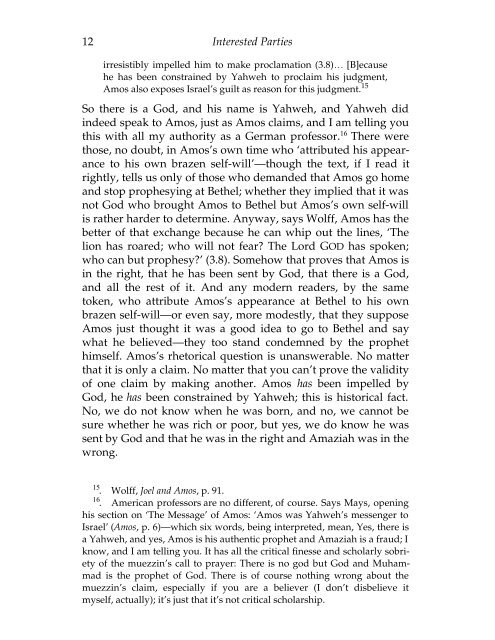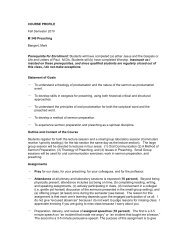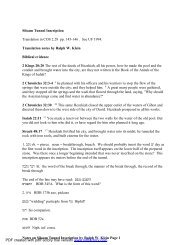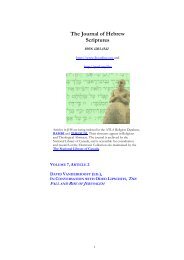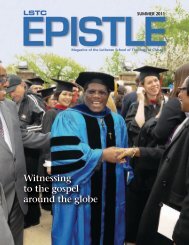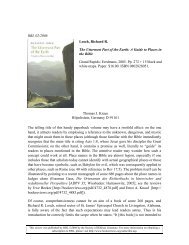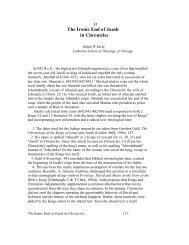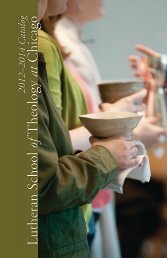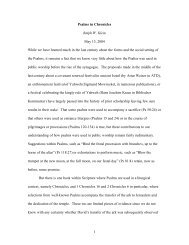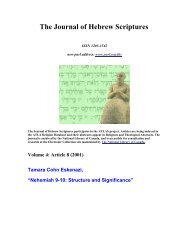Metacommentating Amos* Metacommentary, what is that ... - Fontes
Metacommentating Amos* Metacommentary, what is that ... - Fontes
Metacommentating Amos* Metacommentary, what is that ... - Fontes
Create successful ePaper yourself
Turn your PDF publications into a flip-book with our unique Google optimized e-Paper software.
12 Interested Partiesirres<strong>is</strong>tibly impelled him to make proclamation (3.8) . . . [B]ecausehe has been constrained by Yahweh to proclaim h<strong>is</strong> judgment,Amos also exposes Israel’s guilt as reason for th<strong>is</strong> judgment. 15So there <strong>is</strong> a God, and h<strong>is</strong> name <strong>is</strong> Yahweh, and Yahweh didindeed speak to Amos, just as Amos claims, and I am telling youth<strong>is</strong> with all my authority as a German professor. 16 There werethose, no doubt, in Amos’s own time who ‘attributed h<strong>is</strong> appearanceto h<strong>is</strong> own brazen self-will’—though the text, if I read itrightly, tells us only of those who demanded <strong>that</strong> Amos go homeand stop prophesying at Bethel; whether they implied <strong>that</strong> it wasnot God who brought Amos to Bethel but Amos’s own self-will<strong>is</strong> rather harder to determine. Anyway, says Wolff, Amos has thebetter of <strong>that</strong> exchange because he can whip out the lines, ‘Thelion has roared; who will not fear? The Lord GOD has spoken;who can but prophesy?’ (3.8). Somehow <strong>that</strong> proves <strong>that</strong> Amos <strong>is</strong>in the right, <strong>that</strong> he has been sent by God, <strong>that</strong> there <strong>is</strong> a God,and all the rest of it. And any modern readers, by the sametoken, who attribute Amos’s appearance at Bethel to h<strong>is</strong> ownbrazen self-will—or even say, more modestly, <strong>that</strong> they supposeAmos just thought it was a good idea to go to Bethel and say<strong>what</strong> he believed—they too stand condemned by the prophethimself. Amos’s rhetorical question <strong>is</strong> unanswerable. No matter<strong>that</strong> it <strong>is</strong> only a claim. No matter <strong>that</strong> you can’t prove the validityof one claim by making another. Amos has been impelled byGod, he has been constrained by Yahweh; th<strong>is</strong> <strong>is</strong> h<strong>is</strong>torical fact.No, we do not know when he was born, and no, we cannot besure whether he was rich or poor, but yes, we do know he wassent by God and <strong>that</strong> he was in the right and Amaziah was in thewrong.15 . Wolff, Joel and Amos, p. 91.16 . American professors are no different, of course. Says Mays, openingh<strong>is</strong> section on ‘The Message’ of Amos: ‘Amos was Yahweh’s messenger toIsrael’ (Amos, p. 6)—which six words, being interpreted, mean, Yes, there <strong>is</strong>a Yahweh, and yes, Amos <strong>is</strong> h<strong>is</strong> authentic prophet and Amaziah <strong>is</strong> a fraud; Iknow, and I am telling you. It has all the critical finesse and scholarly sobrietyof the muezzin’s call to prayer: There <strong>is</strong> no god but God and Muhammad<strong>is</strong> the prophet of God. There <strong>is</strong> of course nothing wrong about themuezzin’s claim, especially if you are a believer (I don’t d<strong>is</strong>believe itmyself, actually); it’s just <strong>that</strong> it’s not critical scholarship.


